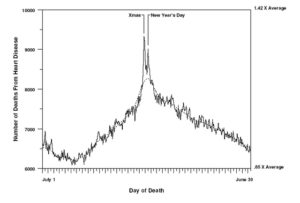
Credit: mysendoff.com
The “Merry Christmas Coronary” or “Happy Hannukah heart attack” is a term that describes the increase in heart attacks around Christmas and New Years. A well known phenomenon, it’s been the subject of research for more than a decade. A national study published in Circulation in 2004 examined 53 million U.S. death certificates from 1973 through 2001. The data revealed an increase of 5 percent in heart-related deaths during the holidays.
Because the holidays coincide with winter in the Northern Hemisphere, researchers have surmised that cold weather might be one reason for the increase in deaths. Wintertime gives rise to flus and colds, which might contribute to increased mortality in people with underlying heart disease. We also know that cold temperatures put strain on the heart, and too much physical exertion in frigid temperatures can result in a heart attack. What’s more, blood vessels constrict in cold weather, which raises blood pressure. Blood clots also form more quickly and easily when temperatures are low.
However, cold weather is not the whole story — studies show that heart attacks don’t just increase in the wintertime. They also specifically spike on Christmas and New Years Day, especially among people who have had no symptoms previously. According to the 2004 Circulation study, “The number of cardiac deaths is higher on December 25 than on any other day of the year, second highest on December 26, and third highest on January 1st.”

Credit: ideastream.org
Meanwhile, over in Melbourne, Australia, where Christmas and New Years fall during warm weather, researchers at the University of Melbourne conducted a study of the “Merry Christmas Coronary” that eliminated the cold weather variable from the data. Examining 25 years of mortality data from New Zealand, where Christmas and New Years coincide with summer, researchers discovered that death rates around the holiday season still increased by 4 percent. Furthermore, the average age of people dying around the holidays is younger than the average for the rest of the year.
So if cold weather isn’t to blame, what’s behind heart attack spike? In the 2004 Circulation study, researchers suggested that one reason might be that people tend to delay getting medical help over the holidays because they don’t want to disrupt the festivities. People who are traveling over the holidays might also take longer to find competent medical care. Additionally, hospitals are sometimes short-staffed during the holidays or staffed by less experienced personnel. Further, people who are already sick might engage in what experts call “displacement of death.” In other words, they try to “hold on” until the holidays are over, hoping to spend one more holiday season with loved ones.
Lastly, some of the most obvious culprits in the mystery of the “Merry Christmas Coronary” are emotional stress and overindulgence in rich foods and alcohol. According to Robert A. Kloner, M.D., Ph.D., a researcher at Good Samaritan Hospital in Los Angeles, “People tend to gain weight during the holiday season and take in more salt, which can put additional stress on a weakened heart.” And while this may dampen our holiday celebrations a bit, it’s also good news because we have some degree control over these things. Each of us can decide to care of ourselves this holiday season by avoiding excess salt and alcohol, continuing to exercise, and finding other ways to manage stress. And these simple lifestyle choices may help ensure that this holiday season is followed by many more to come.

 Causes of the “Merry Christmas Coronary”
Causes of the “Merry Christmas Coronary”



 First the Wealth Gap, Now the U.S. Has a Growing Health Gap
First the Wealth Gap, Now the U.S. Has a Growing Health Gap
 How to Comfort A Dying Loved One
How to Comfort A Dying Loved One
 Our Annual Seven Holiday Gifts for Someone Who Is Grieving, 2024 Edition
Our Annual Seven Holiday Gifts for Someone Who Is Grieving, 2024 Edition














